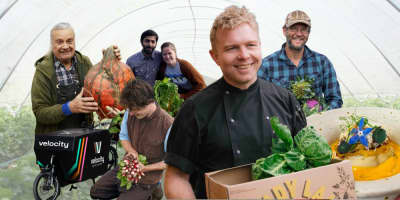This summary was written by Oxford University ECI-funded intern Aaron Hanson.
Good Food Oxford has published a report on food waste practices at the University of Oxford’s colleges in the hope that it will facilitate benchmarking and encourage improvements in how colleges deal with food waste. Food waste is a pertinent topic for institutions which provide catering, as the estimated cost to the British catering industry of wasted meals was valued at
£2.5 billion in 2011. The
Foodprinting Oxford report commissioned by Oxford City Council in 2013 concluded that reducing food waste is the most effective way to reduce the detrimental environmental impact of the city’s food system. Oxford University’s colleges have an important part to play in achieving this, as each college is estimated to
spend on average £400,000 each year on food for its students

and staff. However, while having very similar catering operations and challenges, Oxford’s colleges are characterised by their operational autonomy: hence the importance of providing an overview of practices so that similar institutions trying to achieve the same goals can learn from one
another’s experiences.
In terms of reducing the amount of food which is not eaten or sold in the first place, the report focused on catering operations, finding that 83% of colleges reviewed take some measures to re-use leftover food. Some colleges sell leftover meals the next day at discounted rates, some donate surplus food to local charities, and some improvise with inventive cooking to use up spare bits and bobs!
As regards efforts to more sustainably process or dispose of the food waste which
is produced, 75% of colleges reviewed send it to be separately recycled at anaerobic digestion and composting facilities, which produce energy and useful raw materials for farming. In Oxfordshire, food waste which goes into the residual or general waste bin is incinerated. Several colleges use their food waste on site for their gardens, and several – including

Mansfield College – have begun using a
Garbage Guzzler to hygienically process their waste themselves. Nearly a third of colleges have some facilities to let students recycle food waste from their own cooking, though in order to work well these schemes typically require a threshold level of student cooperation and awareness.
A variety of recommendations were made to help colleges improve where applicable, ranging from investing in the latest cooking equipment and technology, through to cheap, age-old practices such as using compost heaps for vegetable scraps. This
mixture of solutions, including old and new, expensive and innovative, was a key point of the report. It is vital to ensure that colleges are able to remain innovative in how they handle new challenges, juggling cost constraints, legal requirements, student attitudes and more, all the while leading positive change rather than being one step behind.
The full report can be accessed on the GFO website via this link.
 and staff. However, while having very similar catering operations and challenges, Oxford’s colleges are characterised by their operational autonomy: hence the importance of providing an overview of practices so that similar institutions trying to achieve the same goals can learn from one
another’s experiences.
In terms of reducing the amount of food which is not eaten or sold in the first place, the report focused on catering operations, finding that 83% of colleges reviewed take some measures to re-use leftover food. Some colleges sell leftover meals the next day at discounted rates, some donate surplus food to local charities, and some improvise with inventive cooking to use up spare bits and bobs!
As regards efforts to more sustainably process or dispose of the food waste which is produced, 75% of colleges reviewed send it to be separately recycled at anaerobic digestion and composting facilities, which produce energy and useful raw materials for farming. In Oxfordshire, food waste which goes into the residual or general waste bin is incinerated. Several colleges use their food waste on site for their gardens, and several – including
and staff. However, while having very similar catering operations and challenges, Oxford’s colleges are characterised by their operational autonomy: hence the importance of providing an overview of practices so that similar institutions trying to achieve the same goals can learn from one
another’s experiences.
In terms of reducing the amount of food which is not eaten or sold in the first place, the report focused on catering operations, finding that 83% of colleges reviewed take some measures to re-use leftover food. Some colleges sell leftover meals the next day at discounted rates, some donate surplus food to local charities, and some improvise with inventive cooking to use up spare bits and bobs!
As regards efforts to more sustainably process or dispose of the food waste which is produced, 75% of colleges reviewed send it to be separately recycled at anaerobic digestion and composting facilities, which produce energy and useful raw materials for farming. In Oxfordshire, food waste which goes into the residual or general waste bin is incinerated. Several colleges use their food waste on site for their gardens, and several – including  Mansfield College – have begun using a Garbage Guzzler to hygienically process their waste themselves. Nearly a third of colleges have some facilities to let students recycle food waste from their own cooking, though in order to work well these schemes typically require a threshold level of student cooperation and awareness.
A variety of recommendations were made to help colleges improve where applicable, ranging from investing in the latest cooking equipment and technology, through to cheap, age-old practices such as using compost heaps for vegetable scraps. This mixture of solutions, including old and new, expensive and innovative, was a key point of the report. It is vital to ensure that colleges are able to remain innovative in how they handle new challenges, juggling cost constraints, legal requirements, student attitudes and more, all the while leading positive change rather than being one step behind.
The full report can be accessed on the GFO website via this link.
Mansfield College – have begun using a Garbage Guzzler to hygienically process their waste themselves. Nearly a third of colleges have some facilities to let students recycle food waste from their own cooking, though in order to work well these schemes typically require a threshold level of student cooperation and awareness.
A variety of recommendations were made to help colleges improve where applicable, ranging from investing in the latest cooking equipment and technology, through to cheap, age-old practices such as using compost heaps for vegetable scraps. This mixture of solutions, including old and new, expensive and innovative, was a key point of the report. It is vital to ensure that colleges are able to remain innovative in how they handle new challenges, juggling cost constraints, legal requirements, student attitudes and more, all the while leading positive change rather than being one step behind.
The full report can be accessed on the GFO website via this link.



